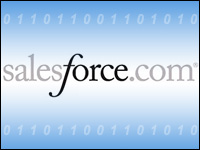
In a slow news week, Salesforce.com had no trouble attracting our attention with a US$31.5 million acquisition of InStranet. The skinny on this company is that InStranet enables customers to build knowledge bases for service and support applications.
It was an area where Salesforce was relatively light, and the addition will strengthen the overall offering when it comes online sometime next year; for now, there is an AppExchange application from InStranet. The big news here is that InStranet is a conventional application, and many tongues were wagging just after the announcement about how perhaps “the end of software” had been somewhat delayed.
Maybe. It certainly makes an interesting angle if you need to fill up a story, but really, is there anything there? In truth, companies have been converting their conventional applications to on-demand for several years. This acquisition will simply mean that Salesforce is drinking the Kool-Aid. Many of the companies I know best are converts, and they can tell you that it’s not an easy thing, though it is rewarding.
Buying the Talent and the App
The more interesting question, to me at least, was why didn’t the company simply bite the bullet and build the functionality from scratch? After all, with a full suite of application development tools at your disposal, no one would blame you for, ah, “forcing” the issue, if you know what I mean. Dammed if you do, dammed if you don’t.
As it turns out, though, despite Salesforce’s avant garde approach to software and the business software marketplace, it looks like this purchase was made for some of the same reasons that companies have been buying each other since the industry first got going. Salesforce executives told me that they bought InStranet because the application is rather sophisticated and because the people in InStranet happen to be considerably talented at this kind of thing.
So it turns out that on-demand is not that different in this regard from any other form of software. It is refreshing to hear that people matter and that even very good companies need to stock up on smart people.
Business Season
Around the same time that Salesforce was announcing the acquisition, the company’s stock was sagging. Although the company had a terrific second quarter with revenues up 49 percent, there was some concern that the bookings that will drive future earnings appeared to be a little soft. Also, the InStranet purchase might cost a nickel per share. Financial analysts, those paragons of free thinking, clobbered the company, sending it down 15 percent. It’s not that there’s any serious problem; rather, the financial whiz kids simply detected that the good news next quarter might not be quite as good.
Salesforce also announced that it is on track to have revenues in the $1 billion range for the current fiscal year, and it is the first company delivering software as a service (SaaS) to reach that level. I can’t do this math, but I wonder what the company’s revenues would be if instead of selling services, it sold licenses in the conventional manner? What would its stock price be then? Was it shrewd to mark them down? I don’t know.
I, for one, am looking forward to September, when everyone comes back to work and we have some real news to analyze. Oracle Open World is coming in September, and several other shows too, ending with DreamForce in November. That should keep us busy, and more importantly, it should keep the finance guys focused on delivering products to customers, the ultimate source of wealth.
Denis Pombriant is the managing principal of the Beagle Research Group, a CRM market research firm and consultancy. Pombriant’s research concentrates on evolving product ideas and emerging companies in the sales, marketing and call center disciplines. His research is freely distributed through a blog and Web site. He is working on a book and can be reached at [email protected].






















































